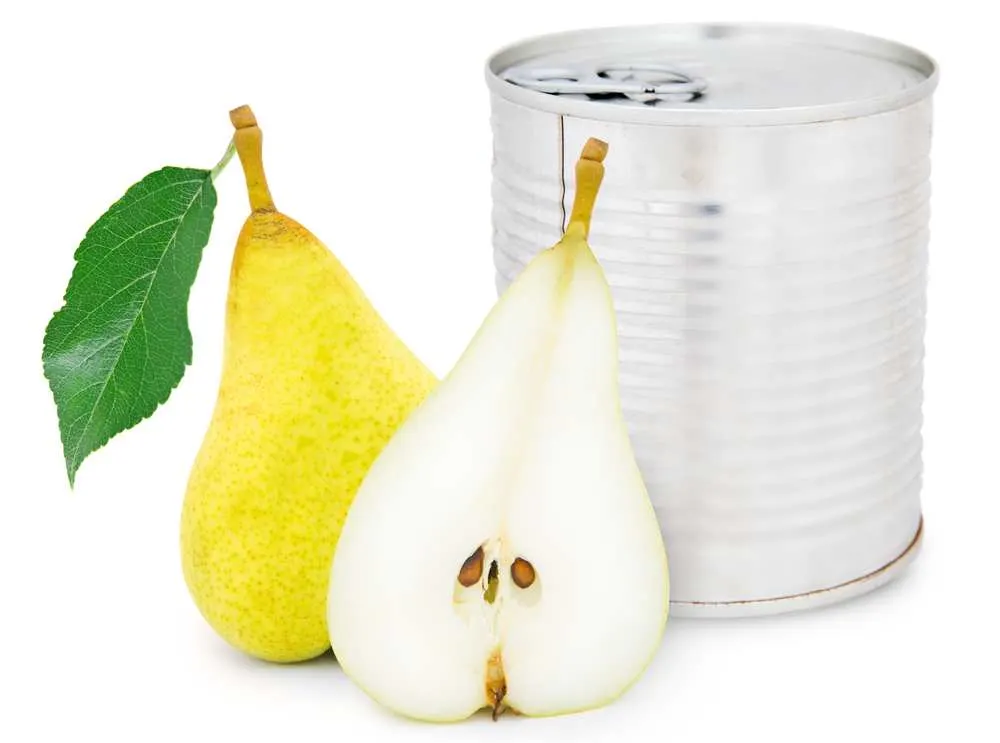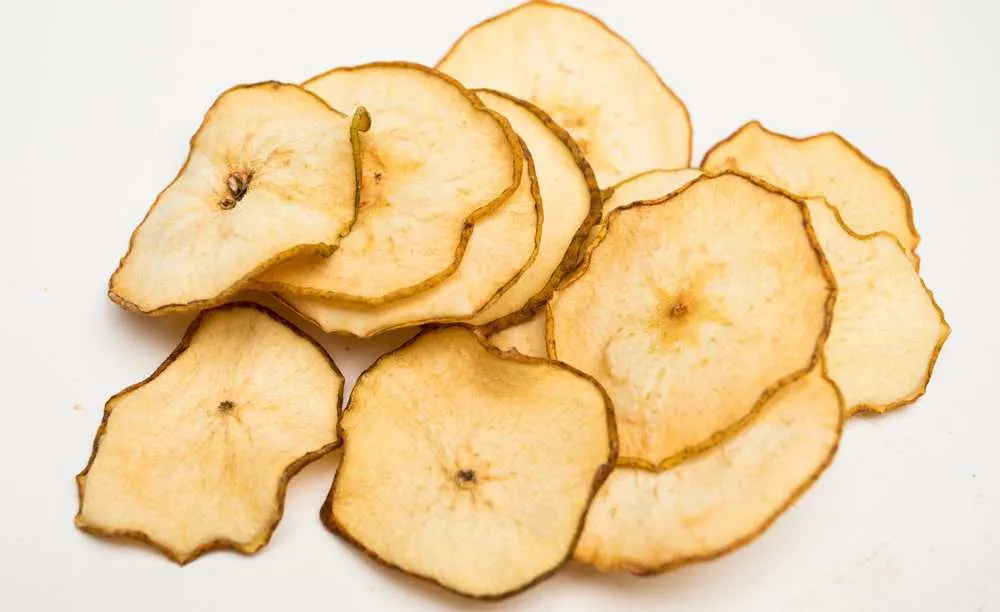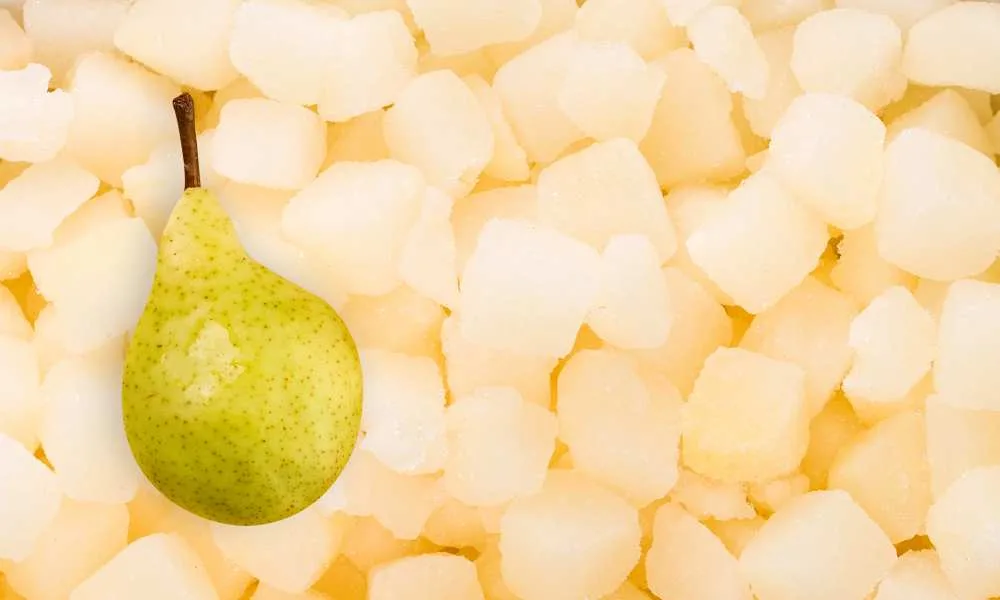Can dogs eat pears? A better question might be, will dogs eat pears?
If you’ve been a dog owner for longer than five minutes, you probably already know for a fact that if your dog gets their mouth on a juicy pear, they definitely will eat it!
But are pears safe for dogs to eat? Are pears healthy for dogs? Should dogs eat pears and if so, how much is safe? Is there anything special you should know about dogs eating pears?
We will take a much closer look at each of these questions in this article. After you finish reading, you will know whether to offer pears to your dog and, if so, how to do so safely.

Should Dogs Eat Pears?
Dogs are very social animals. So whatever you are doing, your dog will likely want to be doing it with you.
And if you are eating something, your dog will likely be eager to eat it with you.
So should dogs eat pears?
The American Kennel Club (AKC) states that pears are essentially fine for dogs to eat, with some qualifications.
The first thing to know here is that not all parts of the pear fruit are safe for dogs to eat.
The Parts Of The Pear Your Dog Shouldn’t Eat
The unsafe parts include the stem and the core with the seeds.
The stem shouldn’t be eaten because it is very tough to chew and digest. It can cause a choking hazard and may even obstruct very tiny dogs.
The core with the seeds can contain cyanide, a toxic poison that is dangerous for dogs. The seeds can also cause a choking risk, especially in very small dogs.
The Parts Of The Pear Your Dog Can Safely Eat
The only part of the pear that is safe for your dog to eat is the fruit itself.
The pear fruit can be either soft or firm depending on the varietal and how ripe it is.
You may be wondering if it is okay to feed your dog the skin of the pear. If the pear is not organic, the skin may contain pesticides or toxins that could cause digestive distress or an allergic reaction.
You can wash the pear with a fruit wash and serve it with the skin on. Alternately, either feed organic pears or skin the pear before you offer it to your dog.

Can Dogs Eat Canned Pears?
Most canned fruits are prepared in a sugar syrup base that makes them unsuitable to feed to dogs.
Not only will the high sugar and calorie content potentially cause weight gain, but it could cause gastric distress or diarrhea.
And if the sugar syrup contains xylitol, a common sugar substitute, it could end up being fatal to your dog.
You should never feed your dog canned pears.

Can Dogs Eat Dried Pears?
Dried fruits of any kind are basically highly concentrated fruit sugars. They are very tasty, of course, and for this reason your dog is likely to love them.
But giving dried pears to your dog is not a good idea both because of the high calories and sugar content and also because dried fruits can be hard to chew and difficult to break down and digest.

Can Dogs Eat Frozen Pears?
It is perfectly fine to offer your dog a small chunk of fresh frozen pears now and again. This is a great summer treat that can be refreshing and enjoyable.
Frozen pears can also help ease tooth pain after a tooth cleaning or dental surgery.
Just don’t offer frozen pears in human food popsicles, sorbets or other forms, since these will likely contain other ingredients that your dog should not be eating.

How To Feed Pears To Dogs?
We recommend cutting up fresh pears into bite-sized pieces to avoid a choking hazard. This is especially important for miniature and toy breed dogs.
Do Pears Have Beneficial Nutrients for Dogs?
Pears actually have a wealth of nutritional benefit for dogs. As Whole Dog Journal reports, pears can be an especially good fruit to occasionally offer your dog because of their nutritional content.
Pears have plenty of copper, dietary fiber, Vitamin K and Vitamin C. And eating fruit in general may help reduce your dog’s risk of future stroke.
| Dietary Fiber | Insoluble dietary fiber is essentially for healthy digestion and elimination. When your dog takes in this type of dietary fiber, it also aids in gut motility and promotes healthy intestinal flora and fauna. |
| Copper | Copper is important for a shiny, healthy coat and healthy immune system function. |
| Calcium | Calcium aids in the growth of healthy bones and teeth and is also an important component of muscle function. |
| Potassium | Potassium is one of the most important natural electrolytes, helping your dog’s cells take in water and supporting healthy heart function. |
| Magnesium | Magnesium is important for healthy muscle function and overall cardiovascular function. |
| Vitamin A | Is there anything Vitamin A isn’t important for? Vision, muscles, bones, coat, skin and even immune system function are all linked to Vitamin A. |
| Vitamin C | Vitamin C is not only a great immune system booster, but it also helps to support healthy joints. |
| Vitamin K | Vitamin K is essential for promoting healthy blood clotting. |
| Antioxidants | Like many fruits, pears also contain antioxidants, natural compounds that have known disease and cancer-fighting properties. |

Can Pears Cause Dog Food Allergies?
More and more dogs today are coming down with food allergies. One of the main reasons for this isn’t necessarily with the foods themselves but with the products used to grow the food.
Organic foods are safer to feed because they are grown without the use of toxic pesticides.
But some dog breeds are more prone to have sensitive stomachs genetically. For these dog breeds, it can be important to stick to a very strict diet to avoid allergy symptoms.
Pears are not known to cause food allergy symptoms in dogs and can even be a good choice to feed dogs with sensitive stomachs. Some commercial dog foods include pear with alternate protein sources to provide complete and balanced nutrition to dogs with food allergies or sensitive stomach issues.
However, the only way to ever know for sure whether your dog is allergic to pears is to try it and see.
The best way to start is to offer just a small chunk or two of fresh pear. Then wait 24 hours and see how your dog reacts. If you don’t see any itching or scratching, rubbing, or head shaking, your dog probably tolerated the pear just fine.
An increasingly common allergic reaction that people get can also happen to dogs. It is called oral allergy syndrome, or OAS for short.
If your dog is allergic to certain pollens, there is an outside chance your pet might have allergies to similar proteins found in certain raw fruits and vegetables, including pears.
For example, if your dog has a known allergy to birch pollen, it is more likely that eating pears will prompt oral allergy syndrome symptoms. This is because the proteins found in pears are quite similar structurally to the pollen produced by the birch tree.
Oral allergy syndrome causes symptoms such as itchy mouth, gum swelling, mouth tissue inflammation, itchy muzzle, watering eyes, and strange mannerisms such as moving the head about, pawing the air, or rubbing the muzzle against something until it is raw.
This is another reason why it is important to start slowly if you want to feed your dog a fresh raw pear treat.
Always contact your dog’s veterinarian if you see any signs of OAS or other food allergy symptoms such as licking the paws, nipping at the skin, rubbing the ears or hindquarters, or skin irritations.
While dogs, in general, can consume fresh raw pears in moderation, this doesn’t necessarily mean that your particular dog can safely eat pears. Some dogs do fine and other dogs don’t.
But even if you do decide to feed your dog pears, it should only be as a very occasional treat food and in small, bite-size portions.
Learn More: What Can Dogs Eat? A Comprehensive List Of Dog-safe Foods


